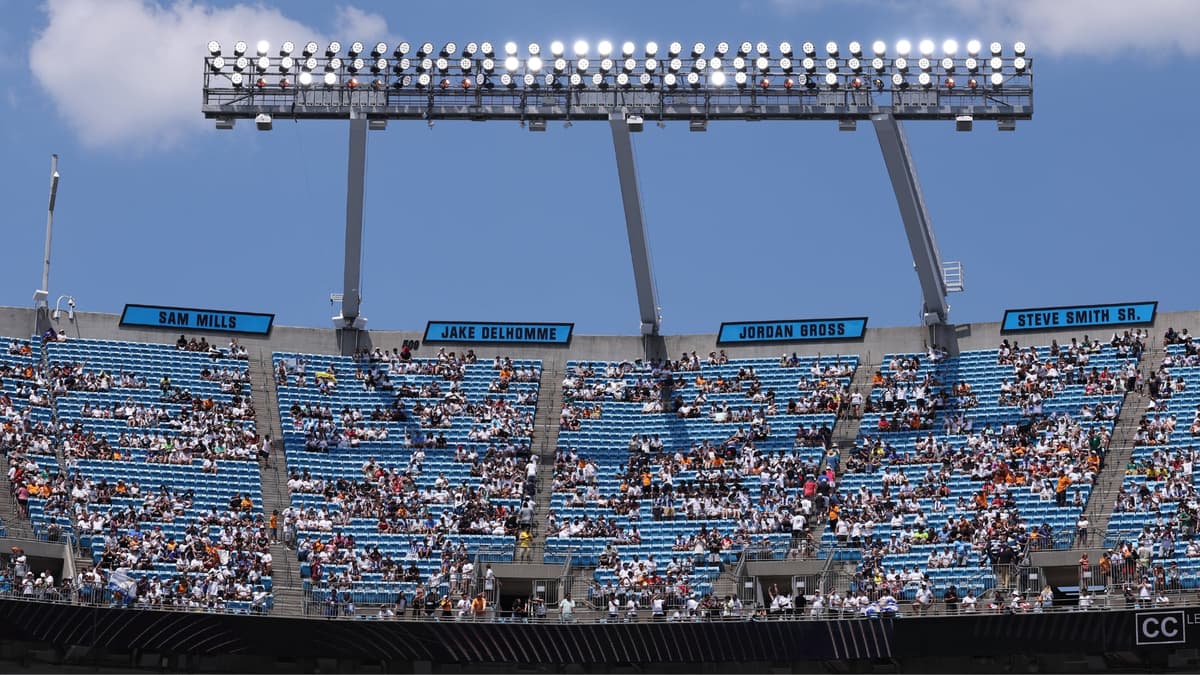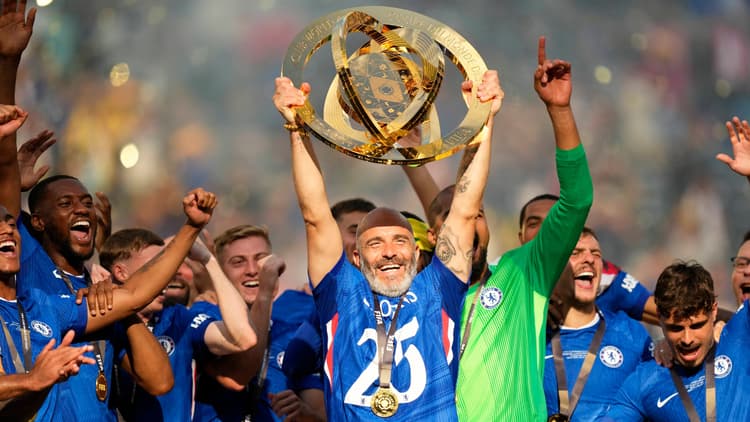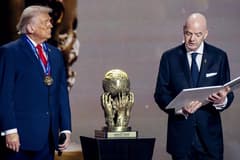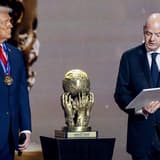-
Nieuws
- 3 Feb 2026
The Club World Cup painted a 2026 World Cup picture - and players, fans and coaches all have the same complaints

Is the United States ready to host the 2026 World Cup?
Every host nation is the subject of scrutiny when staging football's ultimate extravaganza. The Club World Cup showcased America's hosting credentials, but concerns remain.
In 1994, the US hosted the World Cup for the first time. Never shy of a big event, Americans flocked to the stadiums making it the biggest World Cup yet. Diana Ross famously opened the tournament and, after a 24-year hiatus, Brazil triumphed once again on the biggest stage.
Everything about the 2026 World Cup will be super-sized too: the 48 finalists, the 104 matches, the NFL venues, the 16 host cities, the three co-hosts, the accumulated air miles and the projected revenue.
The Club World Cup, in a 32-team format for the first time, helped provide a snapshot of what the 2026 finals could look like.
FIFA "Americanised" the tournament with individual player walk-on introductions, the roll-out of the referee body cameras and a half-time show at the final.
But both FIFA and the hosts were left red-faced by the thousands of empty seats. The strategy of dynamic ticket pricing, common practice in the US, backfired. Drawing an attendance of just 3,412, Mamelodi Sundowns versus Ulsan HD in Orlando, Florida was symbolic of a tournament played at a pre-season pace in sweltering heat in front of disparate crowds.
With low interest, the world governing body scrambled to fill stadiums and was forced to slash prices for the first round, the quarter-finals and the semi-finals.
Some tickets prices for the last eight were as low as $11.15. It was a comedown from the eye-watering pre-tournament ticket prices, including $2,230 for the final.
At the World Cup, FIFA expects more than six million supporters and projects $1.8 billion in ticketing revenue. FIFA is yet to finalise the details of the match schedule but remains determined to maintain dynamic ticket pricing. The timings of the matches will reveal how seriously they have taken the complaints over the heat. In the group stage, a heat wave gripped large swathes of the US.

"It's impossible, a terrible heat, said Atletico Madrid's Marcos Llorente after a lunchtime match against PSG in Pasadena, California. "I felt it in my toes...l couldn't slow down quickly or accelerate."
"I don't think I have ever played in such heat. I don't think it's healthy, to be honest. But I managed to get through it, and the team did too," assessed Benfica's Andreas Schjelderup following his club's 1-0 victory against Bayern Munich in Charlotte, North Carolina. The estimated Wet Bulb Globe Temperature (WBGT) was 29.2°C.
During Juventus' clash with Real Madrid in Miami, Juve head coach Igor Tudor said ten of his players asked to be substituted with temperatures reaching 30°C and humidity 70 per cent, while Dortmund boss Niko Kovac said he was "sweating like I've just come out of a sauna" during the victory over Mamelodi Sundowns. "Our subs watched the first half from inside the locker room to avoid the blazing sun at TQL Stadium," added Dortmund on X.
Enzo Maresca joined the chorus of complaints. Ahead of Chelsea's Group D match against Esperance in Philadelphia, Pennsylvania, the Blues boss said: "It is almost impossible to train or to make a session because of the weather. Now, we are trying just to save energy for the game."
"I had to lie down on the ground because I was really dizzy," added Enzo Fernandez after Chelsea's semi-final at MetLife Stadium in East Rutherford, New Jersey.
"Playing in this temperature is very dangerous!"
FIFA rules mandated cooling breaks at the 30th and 75th minute of play when the WBGT exceeded 32°C (89.6°F).
The pitches themselves also proved problematic. "The ball bounces almost like if it were jumping around like a rabbit," observed PSG boss Luis Enrique, while Jude Bellingham also expressed concern.
"The pitches aren't great," said the Real Madrid star. "It holds up the ball, the ball barely bounces and it's tough on the knees. Hopefully someone will look at that going into the World Cup next year. It's important that we protect the players as well as giving the fans a spectacle."
Extreme weather also played its part.
Chelsea's clash with Benfica was suspended for over two hours and was the sixth game to be halted due to seasonal thunderstorms.
"It's not football," said Maresca. "I understand if it's security reasons, but if you suspend seven or eight games then it's probably not the right place to do the competition."
During the Club World Cup, Atlanta's Mercedes-Benz Stadium was the only covered stadium. In 2026, the World Cup venues in Vancouver, Dallas, Houston and Los Angeles will be roofed. Based on data by the American College of Sports Medicine, FIFPro listed Vancouver and the San Francisco Bay Area as the only two host cities that carry a low risk of heat stress. The world players' union, which launched a legal complaint against FIFA over calendar congestion, proposed a 20-minute half-time break and more cooling breaks as mitigating measures.
Even Arsene Wenger, FIFA's chief of global soccer development, admitted that the heat was something of a problem.
"It was, in some games, a problem", said Wenger. "But we tried to combat it with water breaks and as well by watering the pitches during breaks. I feel that we learned a lot during this time in the tournament because, certainly, we'll be moving to stadiums next year where we will play with roofs, with timing that is a little more sensitive to the heat."
In order to accommodate European TV audiences, just 15 out of 63 Club World Cup matches got underway after 6pm. In 1994, lunchtime kick-offs were the norm for the same reason. The tournament is not remembered for its quality. Rather, Dunga and Romario dragged Brazil through the gruelling Pasadena heat and a nerve-racking penalty shootout against Italy to a fourth global crown. Drenched in sweat, Dunga, vindicated, lifted the World Cup.
FIFA will be hoping for a more memorable edition this time. The US have a history of staging successful, major sporting events.
They staged the 1996 Olympic Games in Atlanta and hosted the 1999 Women's World Cup. The current decade represents another golden age in major sports events: the US will organise the 2026 World Cup and the 2028 LA Summer Olympics. That will be followed by the 2031 Rugby World Cup and the 2031 Women's World Cup.
But the Trump administration is causing deep divides around the world, and its immigration policies are not reassuring for visiting fans, stakeholders and media.
Vice-President JD Vance warned fans about overstaying their visa: "Of course everyone is welcome to come and see this wonderful event. We want them to come...but when the time is up we want them to go home, otherwise they will have to talk to Secretary Noem, said Vance, referring to Kristi Noem, the Secretary of Homeland Security.
FIFA president Gianni Infantino stated that: "America welcomes the world. That's how it has been, is and will be." But his comment doesn't reflect the administration's approach. Donald Trump signed a travel ban for a dozen countries. Members of Senegal's women's basketball team were denied visas for a training camp. Brazilian table tennis player Hugo Calderano, one of the best in the world, was rejected a visa for an elite tournament because he had played at the Pan American Games in Cuba.
Nevertheless, the Trump administration has thrown its weight behind the tournament in other ways. A White House Task Force was established to organise the World Cup.
Congress has passed a policy bill with $625 million in security funding for the 11 American host cities, which are beholden to FIFA's stringent contractual obligations in terms of safety, security and protection.
With Infantino firmly in the orbit of the US president, the World Cup won't escape Trump's influence. His footprint was all over the Club World Cup. FIFA opened an office at Trump Tower and the US president was front and centre at the medal ceremony and trophy presentation.
In 2026, some European supporters might just prefer to give it all a pass.
Words by Samindra Kunti.


















